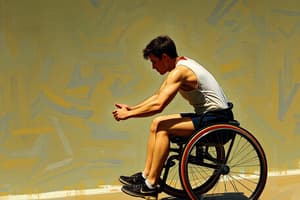Podcast
Questions and Answers
What term is often used interchangeably with 'sports'?
What term is often used interchangeably with 'sports'?
- Social gatherings
- Educational pursuits
- Cultural events
- Physical activities (correct)
Which type of sports may involve badminton, tennis, and table soccer?
Which type of sports may involve badminton, tennis, and table soccer?
- More equipment sports
- No equipment sports
- Individual sports
- Limited equipment sports (correct)
What type of sports can involve activities like soccer, basketball, and baseball?
What type of sports can involve activities like soccer, basketball, and baseball?
- Team sports (correct)
- Individual sports
- Physical activities
- Partner sports
Which sports have a tradition of organized competition within a culture?
Which sports have a tradition of organized competition within a culture?
What type of sports include running, swimming, walking, and dancing?
What type of sports include running, swimming, walking, and dancing?
What type of sports are classified as having high physical demands?
What type of sports are classified as having high physical demands?
Which historical period mentions knights engaging in sports like jousting and tournaments?
Which historical period mentions knights engaging in sports like jousting and tournaments?
Which classification of sports is based on their origin?
Which classification of sports is based on their origin?
What is a common challenge or criticism faced by sports according to the text?
What is a common challenge or criticism faced by sports according to the text?
What benefit do sports provide that can help prevent chronic diseases?
What benefit do sports provide that can help prevent chronic diseases?
Flashcards are hidden until you start studying
Study Notes
Sports have been an integral part of human culture throughout history, with evidence dating back to ancient civilizations like Egypt, Greece, China, Persia, Rome, and Central America. They serve various purposes such as physical exercise, entertainment, social interaction, education, character development, health promotion, and even diplomacy among different nations.
Definition and Classification
The term "sports" is often used interchangeably with "physical activities", "outdoor recreation", and "recreational fitness". However, sports can also refer specifically to competitive team or individual activities that have a long tradition of organized competition within a culture. There are numerous ways to classify sports based on their equipment, number of participants, level of physical demands, competition structure, and origin:
Equipment
Sports can be classified according to the types of equipment used:
- No equipment: Running, swimming, walking, dancing, skipping rope, etc.
- Limited equipment: Badminton, tennis, ping pong, table soccer, etc.
- More equipment: Soccer, basketball, volleyball, baseball, golf, etc.
Participants
Sports can be classified based on the number of participants:
- Team sports: Soccer, basketball, baseball, football, etc.
- Individual sports: Tennis, golf, swimming, running, etc.
- Partner sports: Badminton, tennis, table soccer, etc.
Physical Demands
Sports can be classified based on the level of physical demands:
- Low demand: Yoga, Pilates, walking, swimming, cycling, etc.
- Moderate demand: Running, swimming, cycling, tennis, etc.
- High demand: Soccer, basketball, football, etc.
Competition Structure
Sports can be classified based on the competition structure:
- League-based: Soccer, basketball, football, etc.
- Tournament-based: Tennis, golf, etc.
- Combination: Swimming, running, etc.
Origin
Sports can be classified based on their origin:
- Cultural: Soccer, basketball, baseball, etc.
- Olympic: Swimming, running, golf, etc.
- Hybrid: Table soccer, table tennis, etc.
History and Evolution
The history of sports can be traced back to ancient civilizations. The ancient Egyptians, Greeks, Chinese, Persians, Romans, and Central Americans all engaged in various forms of physical activities. In the Middle Ages, knights engaged in sports like jousting and tournaments. In the 19th century, sports began to be organized into associations and competitions.
Today, sports have evolved into a global industry, with professional leagues, world championships, and international competitions like the Olympics. They have also become a platform for social and political messages, as seen in events like the Black Panther salute at the 1968 Mexico City Olympics.
Benefits and Impact
Sports have numerous benefits, both physical and mental, for individuals and society as a whole:
- Physical health: Sports promote cardiovascular fitness, muscle strength, flexibility, and endurance.
- Mental health: Sports help reduce stress, anxiety, and depression.
- Social interaction: Sports provide opportunities for socialization, teamwork, and building relationships.
- Education: Sports teach discipline, teamwork, and problem-solving skills.
- Character development: Sports help develop self-confidence, self-esteem, and self-discipline.
- Health promotion: Sports promote healthy lifestyles and can help prevent chronic diseases.
- Diplomacy: International sports competitions like the Olympics can foster peace and understanding among nations.
Challenges and Criticisms
Despite their benefits, sports also face challenges and criticisms:
- Commercialization: Sports have become a multibillion-dollar industry, with concerns about athlete exploitation, doping, and corruption.
- Injuries: Sports can lead to injuries, both minor and severe, which can be physically and financially debilitating.
- Social issues: Sports can perpetuate gender, racial, and cultural stereotypes and inequalities.
- Performance-enhancing drugs: Doping in sports has led to ethical and health concerns.
Future of Sports
The future of sports is likely to continue evolving, with advancements in technology, medicine, and social attitudes shaping the landscape:
- Technology: Virtual and augmented reality could change how we experience and participate in sports.
- Medicine: Advances in sports medicine could lead to better injury prevention and treatment.
- Social attitudes: Greater awareness of social issues and a more inclusive approach to sports could lead to a more equitable and diverse community.
In conclusion, sports are a multifaceted aspect of human culture, serving various purposes and benefiting individuals and society in numerous ways. Despite their challenges, sports are likely to continue evolving and playing a significant role in our lives.
Studying That Suits You
Use AI to generate personalized quizzes and flashcards to suit your learning preferences.




